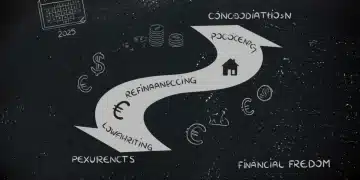Personal Debt Consolidation: Slash Interest Rates by 15% in 6 Months

Personal debt consolidation strategies offer a viable pathway to potentially reduce interest rates by up to 15% within six months through methods like balance transfers, personal loans, and debt management plans, streamlining finances and accelerating debt repayment.
Feeling overwhelmed by mounting debts and high-interest rates? You’re not alone. Many Americans struggle with the burden of juggling multiple debts, making it difficult to achieve financial freedom. Thankfully, personal debt consolidation strategies can offer a path to potentially lower your interest rates by 15% in the next six months, simplifying your finances and saving you money. Let’s explore how!
Understanding Personal Debt Consolidation
Personal debt consolidation involves combining multiple debts into a single, more manageable loan or payment. This can significantly simplify your finances, potentially reduce interest rates, and make it easier to track and pay off your obligations. By consolidating your debts, the goal is to lower your monthly payments and ultimately save money on interest.
Benefits of Debt Consolidation
Debt consolidation offers several key benefits, which can improve your financial well-being and help you achieve your financial goals. One of the main advantages is simplification, where multiple debts are combined into a single payment.
Types of Debts Suitable for Consolidation
Not all debts are created equal, and some are more suitable for consolidation than others. Generally, high-interest debts, such as credit card balances and payday loans, are prime candidates for consolidation.
- Credit card debt.
- Payday loans: Often carry extremely high interest rates, making them a priority for consolidation.
- Medical bills: If you’re facing significant medical debt, consolidation can provide relief.
Understanding personal debt consolidation is the first step towards taking control of your finances. By recognizing the benefits and identifying suitable debts, you can start exploring the various strategies available to you.

Strategies for Lowering Interest Rates
Once you understand the basics of debt consolidation, the next step is to explore specific strategies to lower your interest rates. These strategies can help you save money and pay off your debt faster. Let’s look at some of the strategies you can take to lower interest rates.
Balance Transfer Credit Cards
Balance transfer credit cards offer a promotional period, often ranging from 6 to 21 months, during which you pay 0% interest on transferred balances. This allows you to consolidate high-interest credit card debt onto a single card and pay it down without accruing further interest during the promotional period.
Personal Loans
Personal loans are another popular debt consolidation option. These are typically unsecured loans, meaning they don’t require collateral, and can be used to consolidate various types of debt, including credit card balances, medical bills, and other personal loans.
- Compare interest rates and terms from multiple lenders.
- Consider both secured and unsecured personal loans.
- Factor in any origination fees or prepayment penalties.
By carefully implementing these strategies, you can significantly lower your interest rates and take a major step towards financial freedom.
Implementing a Debt Management Plan (DMP)
A Debt Management Plan (DMP) is a structured approach to debt repayment, typically facilitated by a credit counseling agency. It involves working with a counselor to create a budget and repayment plan that suits your financial situation.
How DMPs Work
When you enroll in a DMP, the credit counseling agency will negotiate with your creditors to lower your interest rates and waive certain fees. The agency then consolidates your debts into a single monthly payment, which you make to the agency, and they distribute the funds to your creditors.
Finding a Reputable Credit Counseling Agency
Choosing the right credit counseling agency is crucial for a successful DMP. Look for non-profit agencies that are accredited by organizations.
- Check for accreditation: Ensure the agency is accredited.
- Review their fees: Understand the agency’s fees.
- Read testimonials and reviews.
Debt Management Plans provide a structured approach to debt repayment, offering the potential for lower interest rates and simplified payments. However, it’s essential to choose a reputable agency and understand the potential impacts on your credit score.

Negotiating with Creditors Directly
In some cases, it may be possible to negotiate directly with your creditors to lower your interest rates or modify your repayment terms. While this approach requires time and effort, it can be an effective way to reduce your debt burden.
Preparing for Negotiation
Before contacting your creditors, gather all relevant information about your debts, including account numbers, interest rates, and outstanding balances. Assess your financial situation and determine a realistic repayment plan that you can propose.
Effective Negotiation Techniques
When negotiating with creditors, be polite, professional, and persistent. Explain your financial situation clearly and demonstrate your willingness to repay your debts.
- Be polite and professional.
- Explain your financial situation clearly.
- Document all agreements: Get any agreed-upon changes in writing.
Negotiating with creditors requires preparation, persistence, and effective communication skills. While it may not always be successful, it can be a worthwhile effort to potentially lower your interest rates and improve your repayment terms.
The Impact of Credit Score on Consolidation
Your credit score plays a significant role in your ability to consolidate debt and secure favorable terms. Lenders use your credit score to assess your creditworthiness and determine the interest rates and loan terms they offer.
How Credit Score Affects Interest Rates
A higher credit score typically translates to lower interest rates on debt consolidation loans or balance transfer credit cards. Conversely, a lower credit score may result in higher interest rates or even denial of your application.
Improving Your Credit Score Before Consolidating
If your credit score is less than ideal, taking steps to improve it before consolidating your debt can lead to better terms and greater savings.
- Pay bills on time: Payment history is a major factor in your credit score.
- Reduce credit card balances.
- Check your credit report for errors: Dispute any inaccuracies you find.
Your credit score is a critical factor in the debt consolidation process. Taking steps to improve your credit score before applying for a loan or credit card can significantly impact the terms you receive and the overall cost of your debt consolidation efforts.
Maintaining Financial Health Post-Consolidation
Debt consolidation is a powerful tool, but it’s essential to maintain good financial habits after consolidating your debts to prevent future financial issues. It’s important to take the steps necessary to assure you don’t revert back to old spending habits.
Creating a Budget and Sticking to It
Developing a budget and sticking to it is crucial for managing your finances and avoiding overspending. Track your income and expenses to identify areas where you can cut back.
Avoiding Future Debt Accumulation
One of the biggest challenges after debt consolidation is avoiding the temptation to accumulate new debt. It’s important to address the underlying causes of your previous debt problems and develop strategies.
- Cut up or freeze credit cards: Make it more difficult to spend impulsively.
- Set financial goals: Stay motivated by focusing on your long-term goals.
- Seek financial education or counseling: Enhance your financial literacy.
Maintaining financial health after debt consolidation requires discipline, good planning, and a commitment to avoiding future debt accumulation. By creating a budget, addressing the root causes of your debt, and developing healthy financial habits, you can ensure long-term financial stability.
| Key Point | Brief Description |
|---|---|
| 💡Consolidation Benefits | Simplifies finances, potentially lowers interest rates, and saves money. |
| 💳 Balance Transfers | Offers 0% interest for a limited time, helping pay down debt faster. |
| 🤝 DMP Advantages | Structured debt repayment plan with potential interest rate reductions. |
| 📈 Credit Score Impact | Good credit leads to better consolidation terms and lower interest rates. |
Frequently Asked Questions (FAQ)
Personal debt consolidation combines multiple debts into a single loan or payment, aiming to simplify repayment and often reduce interest rates. This strategy can streamline your finances and potentially save you money.
Balance transfer cards offer a promotional 0% interest period, allowing you to transfer high-interest debt and pay it down without accruing additional interest. This can accelerate debt repayment.
A DMP is a structured repayment plan managed by a credit counseling agency. They negotiate with creditors to lower interest rates and consolidate your debts into one monthly payment.
A higher credit score typically results in lower interest rates and more favorable terms for debt consolidation. Improving your score beforehand can lead to significant savings and better loan options.
Potential risks include fees, the temptation to accumulate new debt, and the impact on your credit score if not managed properly. Research and careful consideration are essential for success.
Conclusion
Personal debt consolidation strategies offer a viable path to potentially reducing interest rates and simplifying your financial life. By exploring options like balance transfers, personal loans, and debt management plans, you can take control of your debt and work towards a more secure financial future. Remember to assess your situation carefully, seek professional advice if needed, and maintain disciplined financial habits to ensure long-term success.





